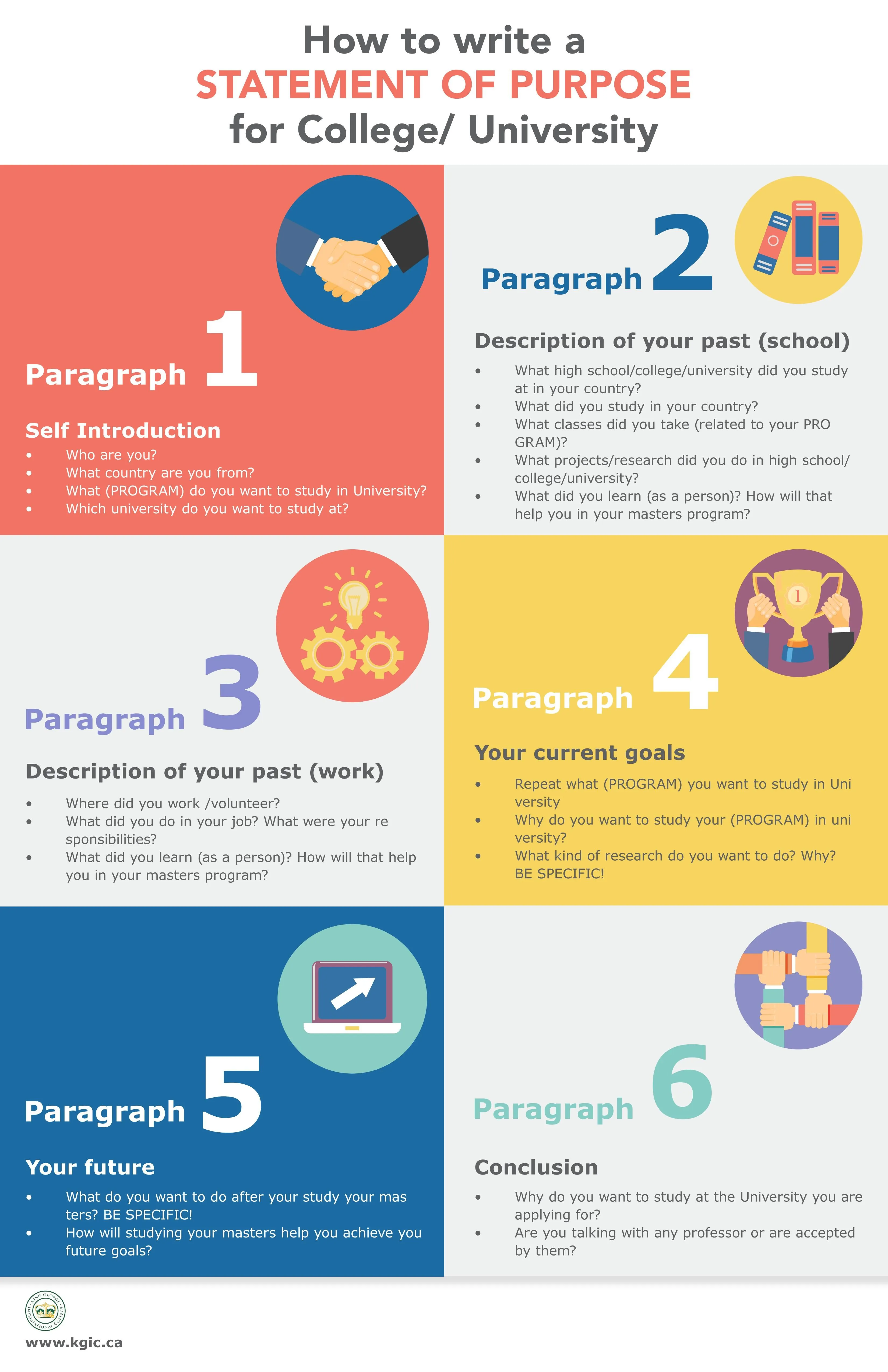Understanding the Importance of a Pharma Cover Letter
In the competitive world of pharmaceuticals, a well-crafted cover letter is your first opportunity to make a strong impression. It’s more than just a formality; it’s a crucial marketing tool that showcases your unique value proposition and compels the hiring manager to read your resume. A compelling cover letter provides context to your qualifications, allowing you to explain how your skills and experience align with the specific requirements of the role and the company’s mission. It highlights your understanding of the pharmaceutical industry and demonstrates your genuine interest in the position. A cover letter is the key to get your foot in the door.
Highlighting Your Skills and Experience
Your cover letter must effectively communicate your skills and experience. Begin by identifying the key skills and qualifications mentioned in the job description. Then, provide specific examples of how you have utilized these skills in previous roles. Quantify your accomplishments whenever possible to demonstrate the impact you’ve made. For instance, instead of saying “Managed clinical trials,” state “Managed 3 Phase III clinical trials, resulting in a 20% increase in patient enrollment.” Tailor your cover letter to match the requirements of each job application. A generic letter is unlikely to resonate with the hiring manager. Use keywords from the job description to ensure your application is easily noticed by Applicant Tracking Systems (ATS).
Researching the Company and Role
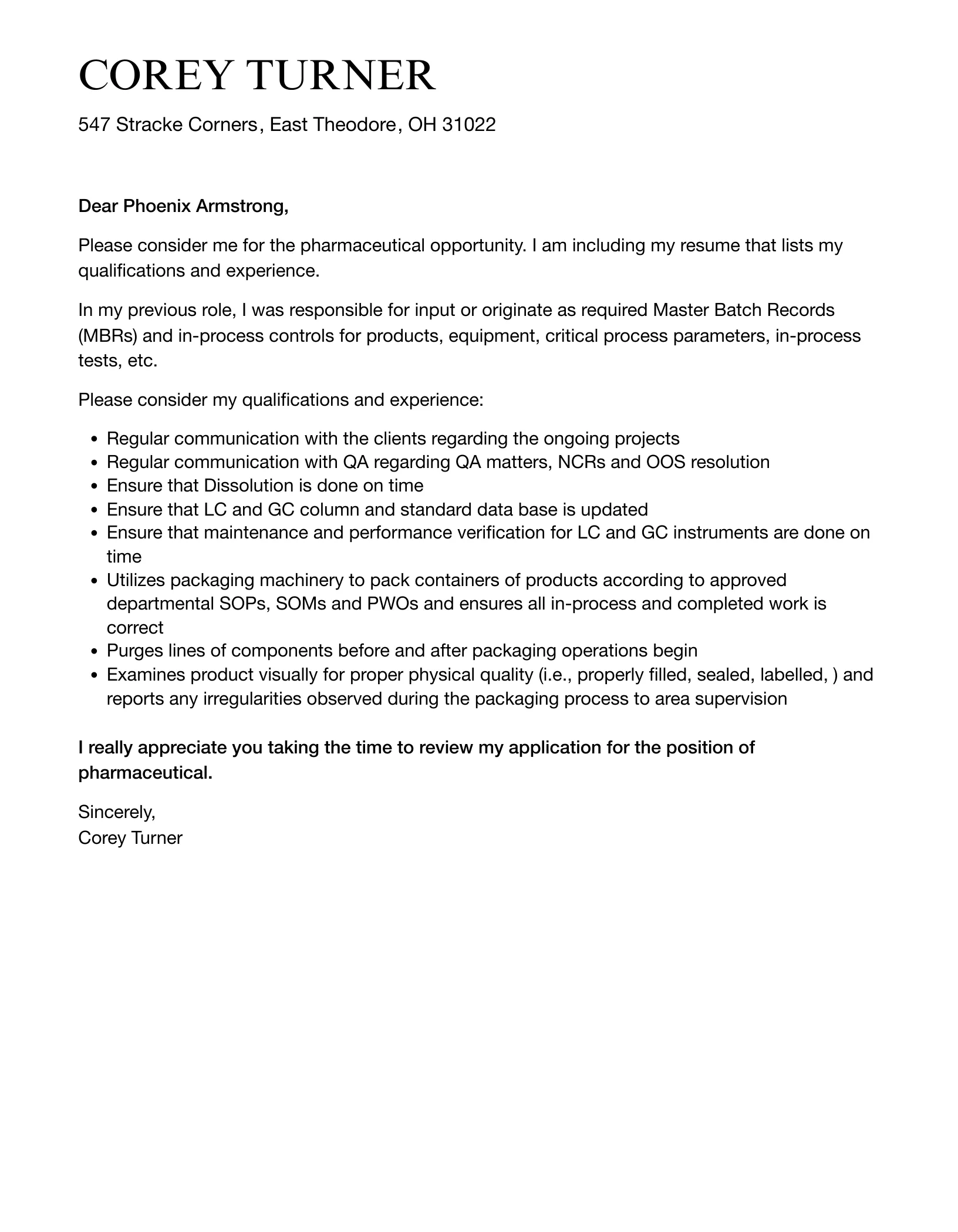
Before you start writing, thoroughly research the pharmaceutical company and the specific role. Understand the company’s products, its mission, and its values. This information will enable you to tailor your cover letter and demonstrate your genuine interest in the organization. Explore the company’s website, social media profiles, and recent news articles to gain insights into its culture, recent achievements, and future goals. When describing the role, focus on the responsibilities and expectations. Highlight the relevant skills and experiences that align with the job description. This demonstrates your understanding of the position and makes your application stand out. A well-researched cover letter shows you’ve taken the time to understand the company and the role.
Tailoring Your Cover Letter
A generic cover letter is a quick path to the rejection pile. Customize each cover letter to fit the specific requirements and expectations of the job and the pharmaceutical company. This involves using the hiring manager’s name (if available), addressing the specific responsibilities of the role, and highlighting your relevant skills and experiences. Use keywords from the job description and company website to optimize your letter for Applicant Tracking Systems (ATS). This will increase the chances of your application being noticed. Tailoring shows that you understand the role and are genuinely interested in the opportunity, setting you apart from the many generic applications.
Key Components of a Winning Pharma Cover Letter
Header and Contact Information
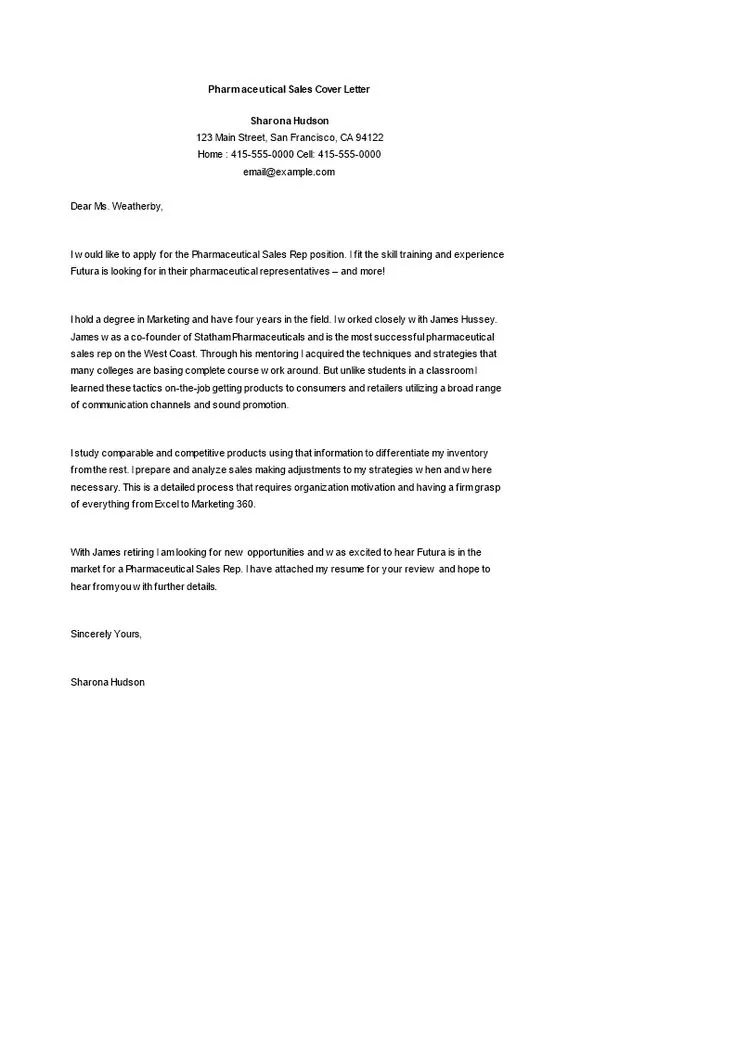
Your header should include your name, address, phone number, email address, and the date. Make sure your contact information is accurate and up-to-date. If applying online, follow the specific instructions for formatting your header. Include the recipient’s name and title (if known) and the company’s address. This demonstrates professionalism and attention to detail. Ensure that your email address is professional and that you check it regularly for correspondence. A clean and well-formatted header sets a positive tone from the very beginning.
Greeting and Introduction
Address the hiring manager by name whenever possible. If their name is unavailable, use a professional greeting such as “Dear Hiring Manager.” In your introduction, briefly state the position you are applying for and where you saw the job posting. Immediately capture the reader’s attention by highlighting a key achievement, skill, or your understanding of the company. This sets the stage for the rest of your letter. Clearly state your intention and express your enthusiasm for the role. A strong introduction makes the reader want to learn more about you and encourages them to keep reading.
Body Paragraphs
The body paragraphs are the core of your cover letter. They should showcase your skills, experience, and how they align with the job requirements. Structure your body paragraphs logically, with each paragraph focusing on a specific skill, achievement, or area of expertise. Provide specific examples to support your claims, using the STAR method (Situation, Task, Action, Result) to illustrate your impact. Use keywords from the job description and tailor your content to match the specific needs of the role and the company. Explain your interest in the company and why you are a good fit. The body paragraphs should tell your story and highlight your value to the organization.
Closing and Call to Action
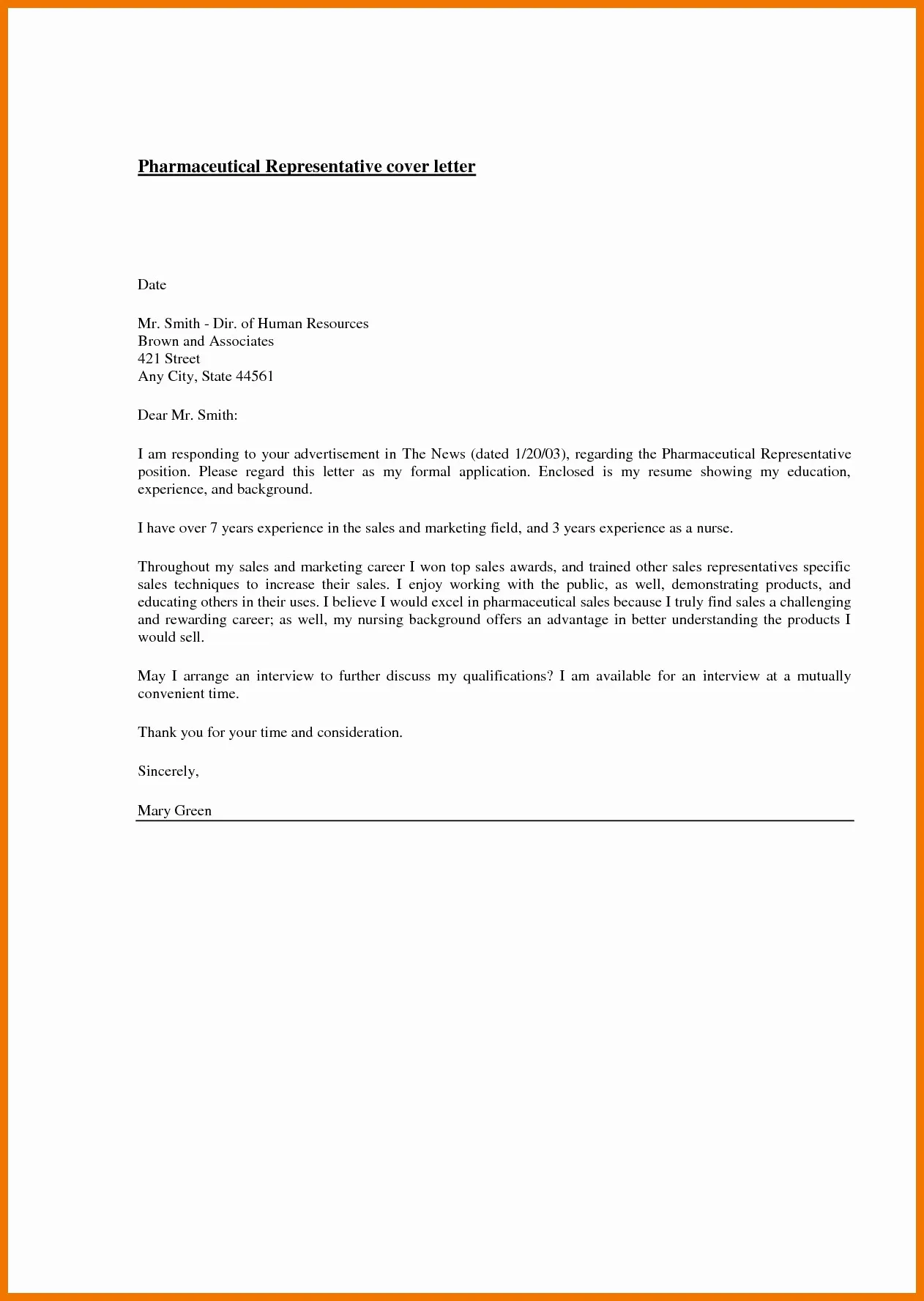
In your closing paragraph, reiterate your interest in the position and the company. Thank the hiring manager for their time and consideration. Include a clear call to action, such as stating that you are available for an interview and look forward to hearing from them soon. Provide your contact information again. This makes it easy for the hiring manager to reach you. Avoid generic phrases. Your closing should be positive and leave a lasting impression. A well-crafted closing can increase the likelihood of a positive response.
Formatting and Proofreading
Use a professional font, such as Times New Roman or Arial, and ensure your cover letter is easy to read. Maintain a consistent font size (11 or 12 points) and use proper spacing. Avoid excessive use of bold or italics. Proofread your cover letter carefully for any grammatical errors, typos, or inconsistencies. Have someone else review your letter as well. Poorly formatted or error-filled cover letters can quickly disqualify your application. Pay attention to the overall layout and formatting to create a visually appealing document. A polished and well-formatted cover letter shows attention to detail and professionalism.
Showcasing Relevant Pharma Skills
Scientific Knowledge
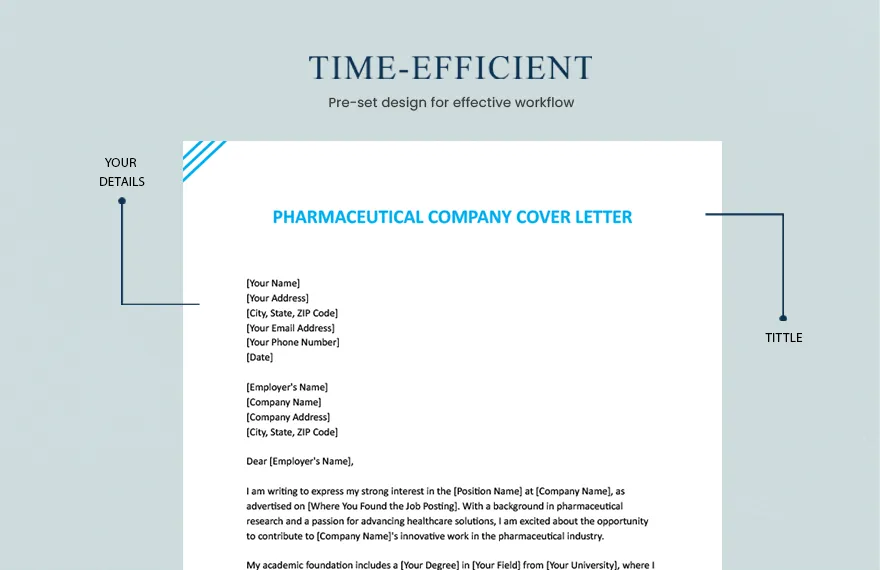
Demonstrate your scientific knowledge by highlighting your understanding of pharmaceutical principles, drug development processes, and relevant scientific literature. Mention any specific areas of expertise, such as pharmacology, toxicology, or clinical research. Provide examples of your ability to apply scientific knowledge to solve problems or contribute to projects. For example, mention your contributions to data analysis, research studies, or the interpretation of scientific results. This shows your capabilities to succeed in a pharma environment, where scientific understanding is paramount.
Communication and Interpersonal Skills
Highlight your communication and interpersonal skills, emphasizing your ability to effectively communicate scientific information to both technical and non-technical audiences. Showcase your ability to collaborate with cross-functional teams, build relationships, and resolve conflicts. Give examples of presentations, reports, or collaborations you have successfully completed. In the pharmaceutical industry, communication is key. Strong communication skills facilitate collaboration, and the sharing of complex data.
Attention to Detail and Accuracy
Emphasize your attention to detail and accuracy, as these are critical in the pharmaceutical industry. Provide examples of your ability to identify and correct errors, adhere to strict guidelines, and maintain high standards of quality. Mention any experience in data analysis, quality control, or regulatory compliance. Accuracy and precision are essential in pharmaceuticals, where errors can have significant consequences. Highlight your ability to work with precision, follow detailed procedures, and ensure the reliability of data.
Industry-Specific Experience
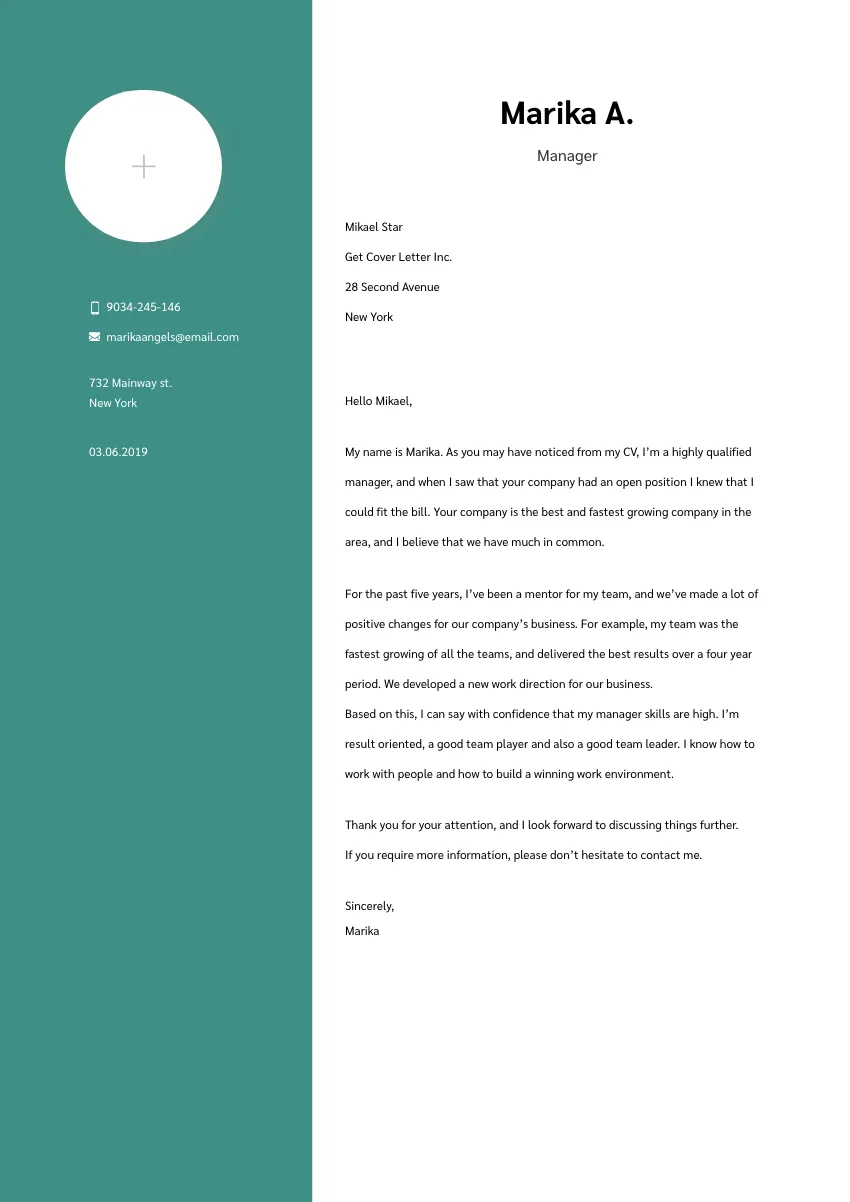
Showcase any experience you have in the pharmaceutical industry, including specific roles, projects, and responsibilities. Detail your knowledge of industry regulations, such as FDA guidelines or GMP standards. Mention any experience with pharmaceutical products, clinical trials, or drug development processes. Highlight your experience with relevant software and technologies. Mentioning any specific industry terminology or acronyms you are familiar with. Industry-specific experience is highly valued in the pharmaceutical field.
Examples of Strong Pharma Cover Letter Content
Highlighting Achievements
Instead of simply listing your job responsibilities, focus on your achievements. Quantify your accomplishments whenever possible. For example, instead of saying, “Managed clinical trials,” state “Managed 3 Phase III clinical trials, resulting in a 20% increase in patient enrollment.” Use the STAR method (Situation, Task, Action, Result) to describe your achievements. This approach helps the reader understand the context, your role, and the positive outcomes you achieved. Achievements demonstrate your value and potential.
Quantifying Accomplishments
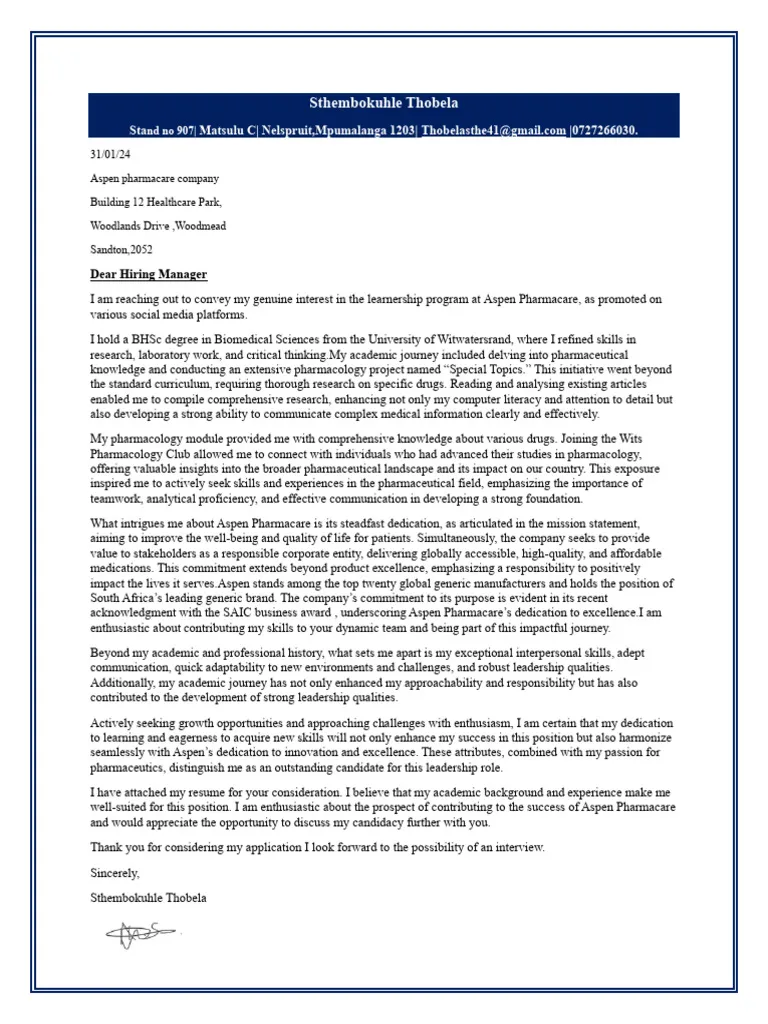
Whenever possible, quantify your accomplishments to demonstrate the impact you’ve made. Use numbers, percentages, and specific data points to illustrate your successes. For instance, “Increased sales by 15% in Q4 2022,” or “Reduced project costs by 10% through effective resource management.” Providing tangible results adds credibility to your claims and makes your achievements more impactful. Numbers grab the hiring manager’s attention and help them understand your contributions.
Demonstrating Passion for Pharma
Express your genuine interest in the pharmaceutical industry and your passion for contributing to advancements in healthcare. Mention any specific areas of interest, such as drug development, clinical research, or patient care. Reference any relevant industry events, publications, or trends that demonstrate your engagement with the field. Show how your values align with the company’s mission and values. Enthusiasm and a passion for the industry are traits that are highly valued by recruiters. This makes the hiring manager feel your strong drive.
Common Mistakes to Avoid in a Pharma Cover Letter
Generic Cover Letters
Avoid sending generic cover letters that are not tailored to the specific job and company. Recruiters can easily spot generic letters. Customize your cover letter for each application, addressing the specific requirements of the role and highlighting your relevant skills and experiences. Research the company and tailor your letter to show that you understand their mission and values. Generic cover letters suggest a lack of effort and interest. This sends a message that you are not particularly interested in the role.
Typos and Grammatical Errors
Typos and grammatical errors can make your cover letter look unprofessional. Always proofread your cover letter carefully before submitting it. Have someone else review your letter as well. Poorly written content reflects poorly on your attention to detail and your ability to communicate. Use grammar and spelling tools to ensure your letter is polished and error-free. Always check for errors before sending your application. Typos and errors make a bad first impression.
Focusing on Yourself Too Much
While it is important to highlight your skills and experience, avoid focusing too much on yourself. Instead, emphasize how your skills and experiences can benefit the company. Show how you can contribute to their goals and how your values align with their mission. Frame your achievements in terms of the positive impact you had on your previous employers and how you can bring similar value to the new company. The aim is to show how your skills can meet the company’s needs.
Failing to Tailor the Letter
Failing to tailor your cover letter is a major mistake. Always tailor your cover letter to each specific job and company. Highlight the skills and experiences that align with the job description and explain how your background makes you a good fit for the role. Generic cover letters make you look disinterested. Show that you’ve done your research, understand the company’s needs, and are genuinely interested in the opportunity. Tailoring makes your application more appealing to the hiring manager.
Finalizing and Submitting Your Cover Letter
Proofreading and Editing
Before submitting your cover letter, proofread it carefully for any errors. Check for typos, grammatical errors, and inconsistencies. Have someone else review your cover letter as well to catch any mistakes you may have missed. Make sure the formatting is correct and the content is well-organized. Proofreading is essential to ensure that your cover letter is polished and professional. A well-written cover letter enhances your credibility and increases your chances of getting hired. Proofread for any errors so as not to impact your application.
Submitting Your Cover Letter
Follow the instructions provided by the employer when submitting your cover letter and resume. Ensure that you submit your application by the deadline. If the employer requests a specific file format, follow their instructions. Send your cover letter as a PDF file. Always ensure that the contact information on your cover letter is accurate. Following the instructions and submitting a well-formatted cover letter demonstrates your attention to detail and professionalism. Following instructions increases the likelihood of your application being considered.
